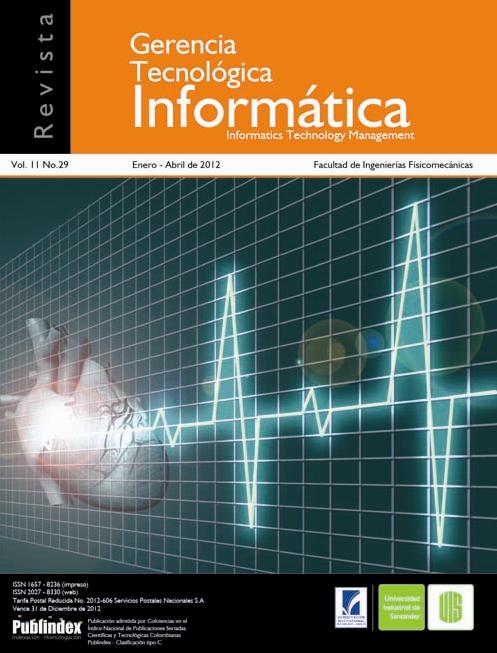Published 2012-10-09
How to Cite
Abstract
RESUMEN ANALÍTICO
A través de este artículo se muestra como IPSec puede brindar un nivel de seguridad a la información en las redes de datos que soportan el protocolo de internet de siguiente generación IPv6 y además, establecer una comparación del comportamiento del tráfico IP a través del uso de servicios de seguridad criptográfica para observar cómo influye en el rendimiento de la red. Se describen las diversas herramientas que se pueden encontrar en Internet y se pueden descargar gratuitamente, se propone uno de los más conocidos el Wireshark (Ethereal), un analizador de protocolos utilizado para realizar análisis y solucionar problemas en redes de comunicaciones para desarrollo de software y protocolos, y como una herramienta didáctica para educación. Se medirá el flujo de datos con y sin IPSec para IPv6, se buscan resultados que permitan ser analizados y generar conclusiones sobre como los mecanismos de seguridad a través de protocolos son aplicables a solucionar las problemáticas de seguridad en el ambiente de las redes e Internet, no antes tener una idea clara de los requisitos de seguridad, ya que la solución depende de cada escenario. Finalmente se analizará el flujo de datos de los resultados obtenidos de la prueba con y sin IPSec para IPv6, y así generar el análisis comparativo del tráfico de datos con y sin IPSec habilitado para IPv6.
PALABRAS CLAVES: Gestión, IPSec, IP, IPv6, Seguridad
IMPLEMENTATION OF SECURITY INTERNET PROTOCOL VERSION 6
ANALYTICAL SUMMARY
Through this article shows how IPSec can provide a level of security to information in data networks that support the Internet Protocol Next-Generation IPv6 and also a comparison of the behavior of IP traffic through the use of services cryptographic security to see how it affects the network performance. It describes the various tools that can be found on the Internet and can be downloaded free of charge, we propose one of the most popular the Wireshark (Ethereal), a protocol analyzer used to perform analysis and solve problems in communication networks and software development protocols, and as a teaching tool for education. It will measure the flow of data with and without IPSec for IPv6, is looking for results that can be analyzed and general conclusions about how the security mechanisms via protocols are applicable to solve the problems of safety in the network and the Internet, not before having a clear idea of the security requirements, since the solution depends on the stage. Finally, analyze the data flow test results with and without IPSec for IPv6, and generate a comparative analysis of data traffic without IPSec enabled for IPv6
kEYWORDS: IPSec, IP, IPv6, Management, Security
Downloads
References
- MAIORANO, Ariel. CRIPTOGRAFÍA Técnicas de desarrollo para profesionales. Alfaomega. Año 2009.
- BEHROUZ, A. Forouzan. Transmisión de datos y redes de comunicaciones, cuarta edición. McGrawHill. Año 2007.
- CARRACEDO, Gallardo Justo. Seguridad en redes telemáticas. McGraw-Hill. Año 2004
- RICO, Dewar y SANTOS, L. M. Seguridad de protocolo de internet: estado del arte. Ingenio UFPSO. Año 2009.
- OLIFER Natalia y OLIFER Víctor. Redes de computadores. McGraw-Hill. Año 2009.
- ETERSEN, Richard. Linux VI Edición. McGraw-Hill. Año 2009.
- STALLINGS, William. Network security essentials applications and standards, fourth edition. Prentice Hall. Año 2011.
- REFERENCIAS ELECTRÓNICAS
- RICO, Dewar y SANTOS, L. M. IPSec DE IPv6 EN LA UNIVERSIDAD DE PAMPLONA [en línea] [citado el 10 de abril de 2010]
- RICO, Dewar y SANTOS, L. M. IPSec DE IPv6 EN LA UNIVERSIDAD DE PAMPLONA [en línea http://www.utp.edu.co/ciencia/index. php?UnArt=1&&id=1102> [citado el 10 de abril de 2010]
- Publib.boulder.ibm.com. Protocolo Cabecera de Autenticación (AH) [en línea] [citado el 10 de abril de 2010]
- Publib.boulder.ibm.com. Protocolo Encapsulated Security Payload (ESP) [en línea] [citado el 10 de abril de 2010]
- SciencieDirect. Security threats to Internet: a Korean multi-industry investigation [en línea] <http://linkinghub.elsevier.com/retrieve/pii/ S0378720601000714> [citado el 11 de abril de 2010]
- 6SOS, IPv6 Servicio de información y soporte. El protocolo IPv6. [en línea] <http://www.6sos.org/ documentos/6SOS_El_Protocolo_IPv6_v4_0.pdf> [citado 12 de abril de 2011]
